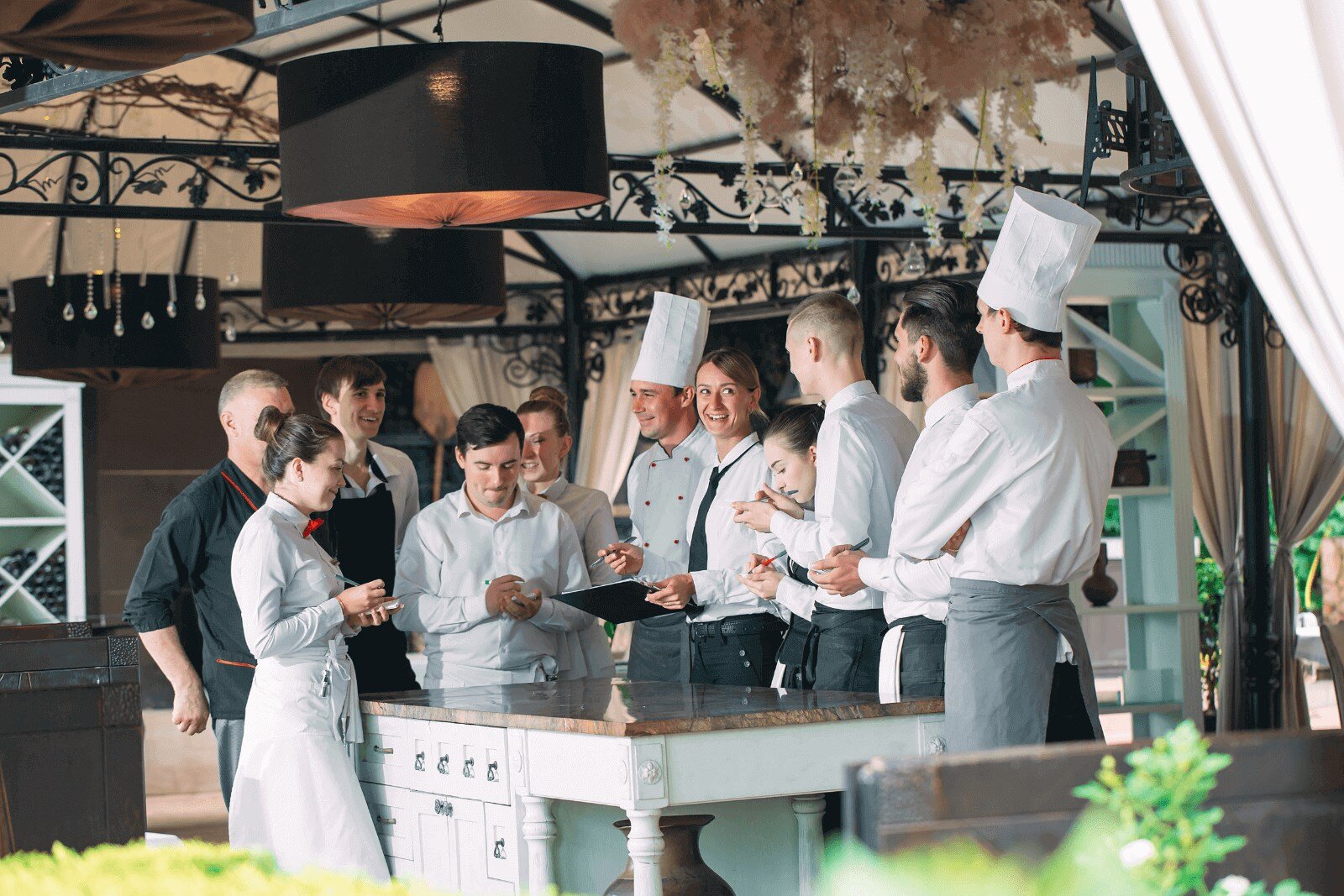In today's digital world, online reservation systems are practically a must-have for restaurants.
But if you've been happily managing things with pen and paper all these years, it might be hard to see any reasons for switching.
After all, the "if it ain't broke, don't fix it" mindset is understandable.
However, in this article, we'll hopefully persuade you by diving into the tangible benefits online reservation systems bring to the table.
We'll cover five key areas, ranging from enhancing the guest experience to automating tedious tasks, and provide you with insights that can fuel your success.
Stick around to discover how an online reservation system might be the upgrade your restaurant didn't know it needed.
Improves Guest Experience
Let’s first see how your guests benefit from these systems.
These days, diners crave convenience and expect effortless online experiences.
Trying to call a restaurant for a reservation, especially during peak hours, doesn’t fit the bill.
Nobody wants to deal with the endless ringing or being put on hold just when they've decided where to eat.
That's where online reservations shine.
First off, they're available 24/7.
Whether a guest is inspired by a food post on Instagram, exploring options on Google Maps, or browsing a restaurant’s website, they can act on that impulse immediately.
Sometimes that urge to book hits after you've closed for the night.
If you implement an online reservation system, those moments of inspiration can turn into confirmed reservations with a few simple clicks.
Let's use a scenario we've all experienced—searching for a restaurant on Google Maps.
Imagine a hungry guest craving something European and browsing nearby options.
They stumble upon the listing of Amber Restaurant and notice that tempting "Find a Table" button right there on the profile card.
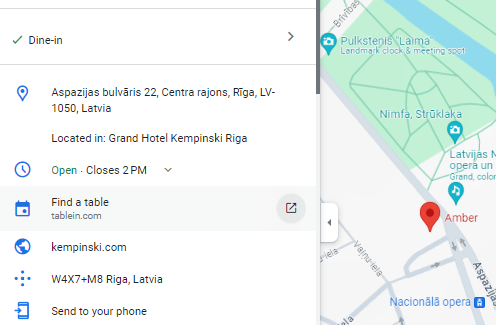
Source: Amber on Google Maps
That one click changes everything.
Instead of needing to search for the restaurant website, and then hunt for their reservation page or, even worse, their phone number, they're whisked straight to a sleek booking widget shown below.
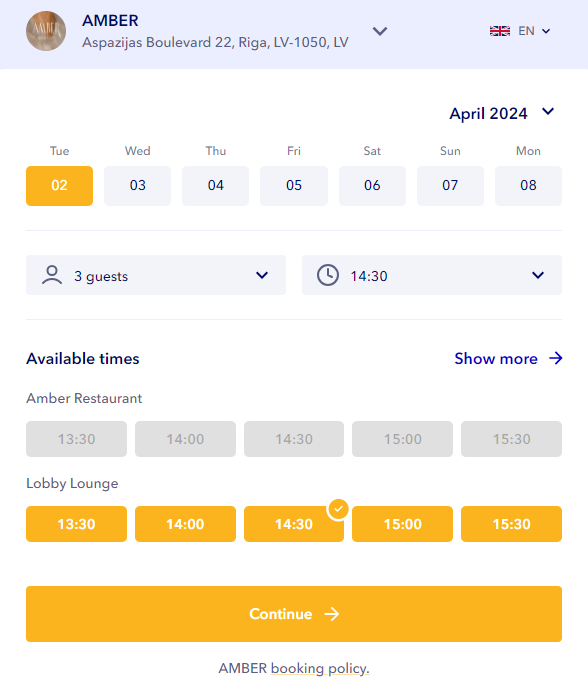
Source: Tablein
The guest picks their date, time, and how many people are dining, all with minimal effort.
Intrigued diners might also glance at the booking policy, checking details like how far in advance they can cancel or if there's a time limit on how long you'll hold their table.
With that settled, all they need to do is add their contact info: their name, phone, and email address.
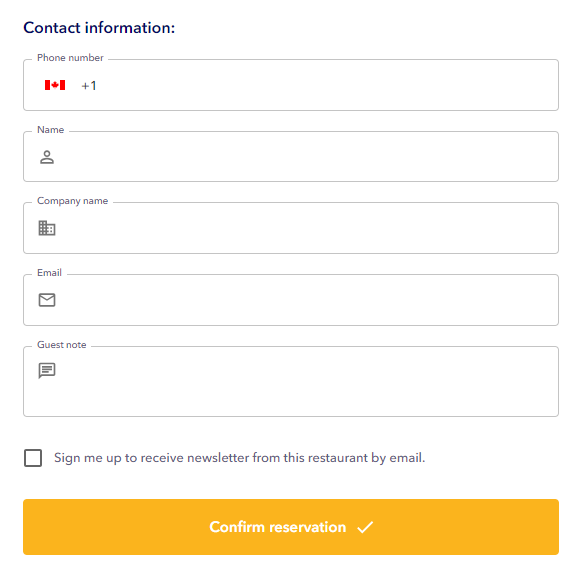
Source: Tablein
They can also add a quick note with special requests, decide whether they want to receive marketing updates, and—unless you have unique requirements like pre-payment for special events—the reservation is complete!
That quick, frictionless process is the heart of what online reservation systems offer guests.
It mirrors the digital experiences they expect in every other aspect of their lives, leading to happier diners and repeat bookings.
Reduces Manual Reservation Management
Beyond the guest experience, reservation systems are a lifesaver for your staff, slashing the time spent on manual reservation management.
Just think about how inefficient that whole process can be.
Consider a guest with a last-minute change of plans that needs to cancel.
Their first instinct might be to call the restaurant or send a quick email.
Suddenly, you or your staff are stuck on the phone or typing out replies, perhaps even explaining a late cancellation fee to the frustrated guest.
Not ideal, is it?
And let's not forget the sheer volume of simple tasks, like looking up basic booking details for guests who call and can't remember exactly what time slot they booked a table for.
Wouldn't you love online reservation software to handle those tasks for you?
Let’s start with how these systems can help guests remember reservation details.
After a booking has been made, a robust reservation system should prominently show the key reservation details and automatically send a confirmation email.
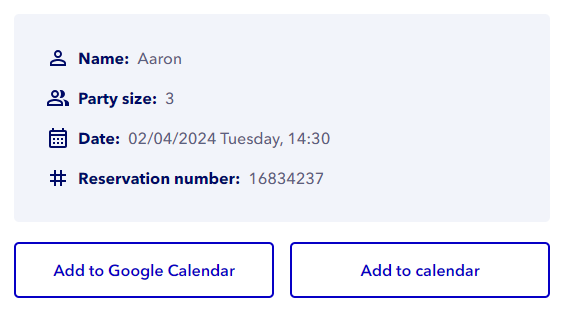
Source: Tablein
And see those "Add to Calendar" buttons?
Imagine a guest booking their anniversary dinner weeks ahead.
With just a click of a button, their reservation now sits neatly on their own calendar, so you don't even need to worry about sending reminders!
But what if you need to do more than just send reminders?
What if you need to find a specific reservation, with only a few details to go on?
Old-school methods mean flipping through endless notes, hoping the right reservation appears.
Now, take a look at the search interface of our own online reservation system, Tablein.
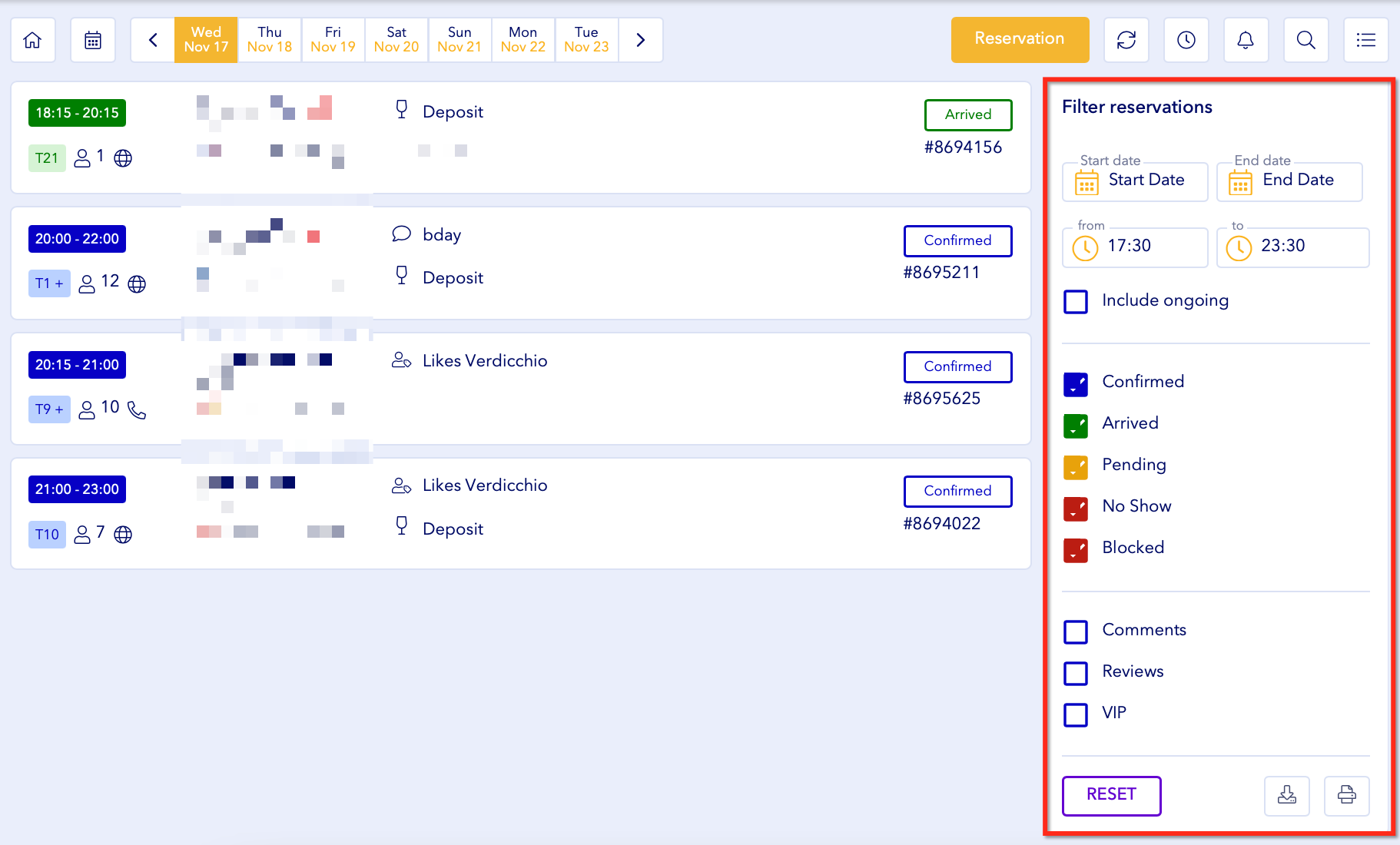
Source: Tablein
Filters, search bars, and your entire reservation list are at your fingertips.
You can find what you need by date, name, party size, or any other detail you can think of.
And what if you need to update a reservation, or change its status?
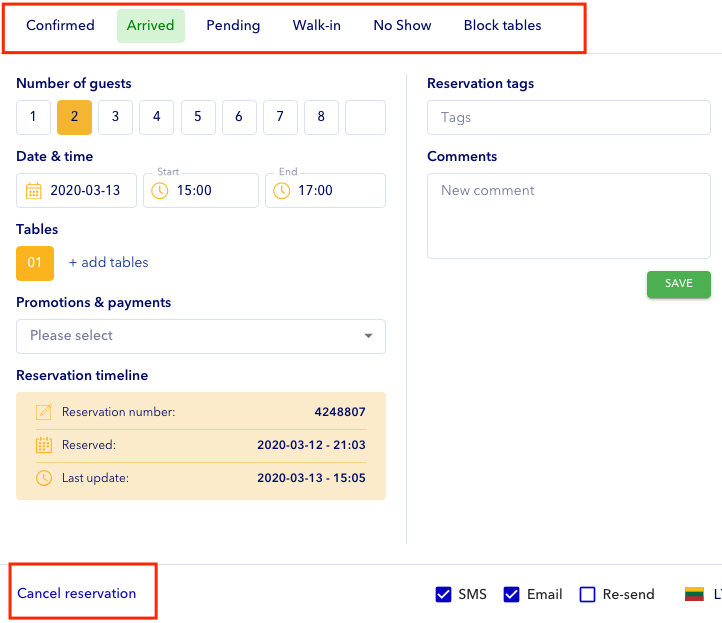
Source: Tablein
With just a few clicks, you can change tables, confirm the reservation, or adjust the number of guests.
A flexible reservation system streamlines those constant little tweaks that can eat up so much of your team's time.
The bottom line is that the right reservation system transforms reservation management from a potential headache into an efficient, automated process.
Minimizes Human Error
Let's be honest—even the most organized person slips up sometimes, especially in a busy restaurant.
From a misheard phone number to a reservation jotted down on the wrong day, those little errors can ripple into big problems for both you and your guests.
Think about taking reservations by hand using the classic reservation book.
Sure, you could take your time, carefully writing each detail with perfect penmanship.
But the reality is that during a busy shift, the reservation book often looks like the illustration below.
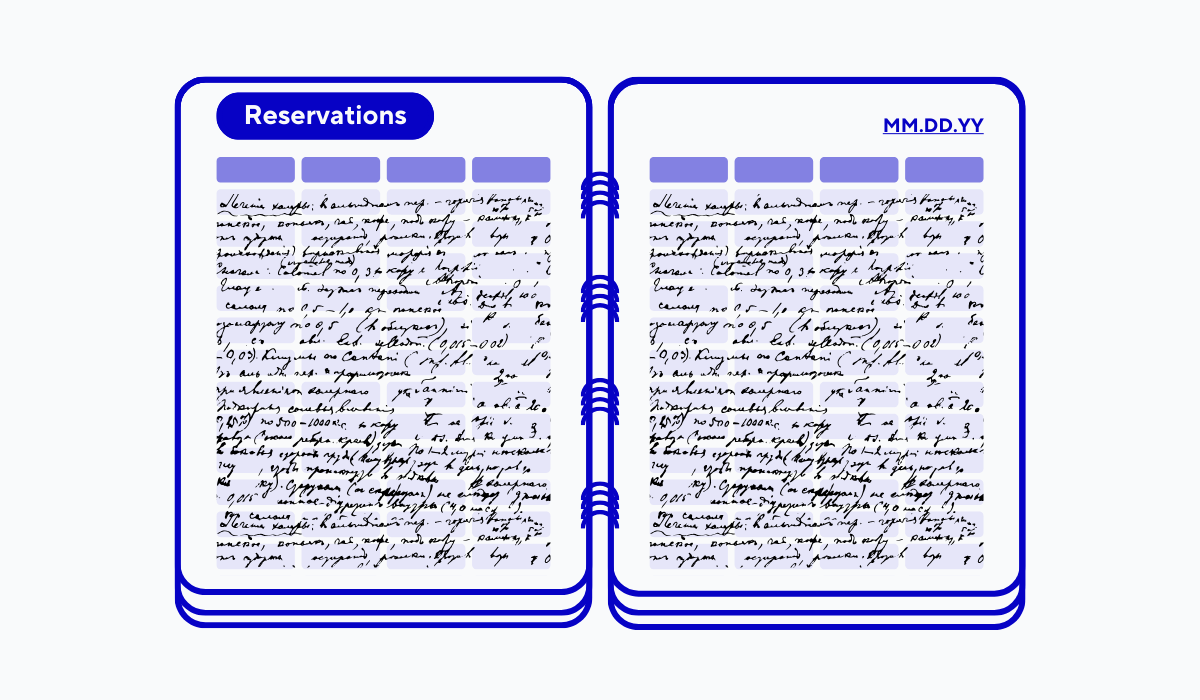
Source: Tablein
Is that a party of 8, or is it a smudged 6? And was the reservation for Tuesday or Wednesday?
Mistakes like these can easily cause you to end up with overbookings, frustrated guests losing their spots, and wasted staff time.
With online bookings, all guest data goes straight into the system and on the digital reservation list.
Even when staff do need to manually input a reservation, the system assists.
After all, typing on a keyboard or tapping a screen is far less likely to cause misinterpretation compared to a hasty scribble.
Or, consider the all too common double booking errors.
Say a guest calls, your staff finds a suitable table and confirms their reservation—but neglects to jot it down in the reservation book.
Suddenly, that table is promised to a guest on the waitlist, creating a recipe for frustrating experiences like the one shown below.
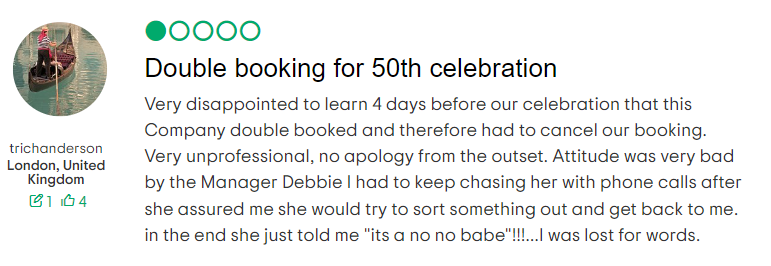
Source: TripAdvisor
With a reservation system with real-time availability options, a booked table is immediately reflected as such across the board and everyone is working with the same, current data.
Online reservation systems like Tablein go a step further, with color-coded table layouts making it even easier to spot the status of each table.
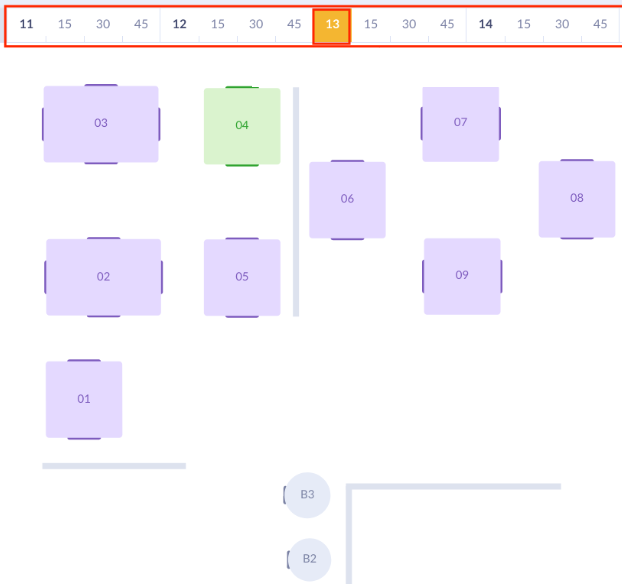
Source: Tablein
With one glance, your staff knows if a table is truly available, currently occupied, or reserved for an upcoming booking.
That extra layer of clarity further minimizes the chance of giving away a booked spot.
By streamlining data entry, automating confirmations, and providing visual clarity, these systems vastly reduce the likelihood of human error.
Reduces No-Shows
Next up, let’s see how reservation systems offer a whole arsenal of features specifically designed to tackle no-shows.
For starters, there’s the classic weapon against forgetful guests—confirmation emails.
Here’s what such an email notification looks like in our online reservation system, Tablein.
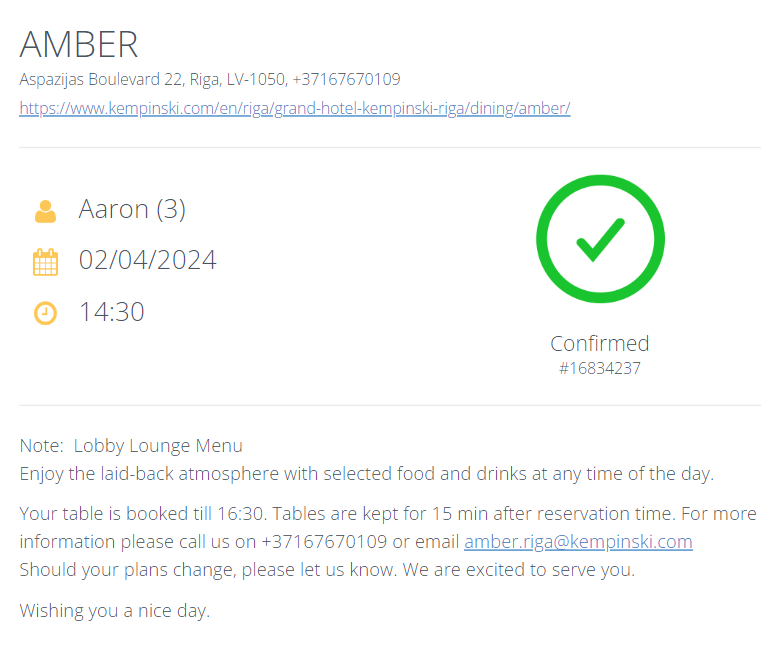
Source: Tablein
As you can see, the email contains all the relevant table booking information.
Plus, you can also include your booking and cancellation policy as a gentle reminder that guests are expected to honor the reservation.
These confirmations are already quite useful for reducing no-shows.
They both reassure guests that everything went through correctly and also give them something to refer back to, minimizing missed reservations because of forgotten booking details.
But, what if you're facing a serious no-show problem?
Sometimes, confirmations alone don't cut it and you need approval emails like the one shown below.
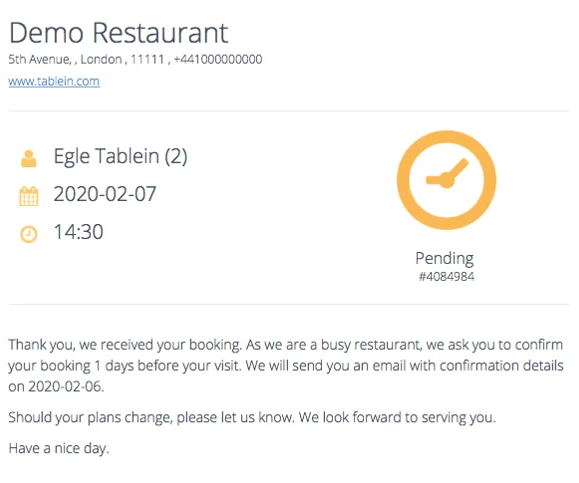
Source: Tablein
By requiring this extra step of manually confirming a reservation the day before, you can weed out those impulsive bookings and ensure that people who truly want a table secure their spot.
Okay, so all of these emails are great, but inboxes get messy.
A confirmation email can get lost in a pile of marketing messages, or even get filtered out as spam by mistake.
A text message, on the other hand?
Those get through and get noticed almost immediately. Just check out these stats.
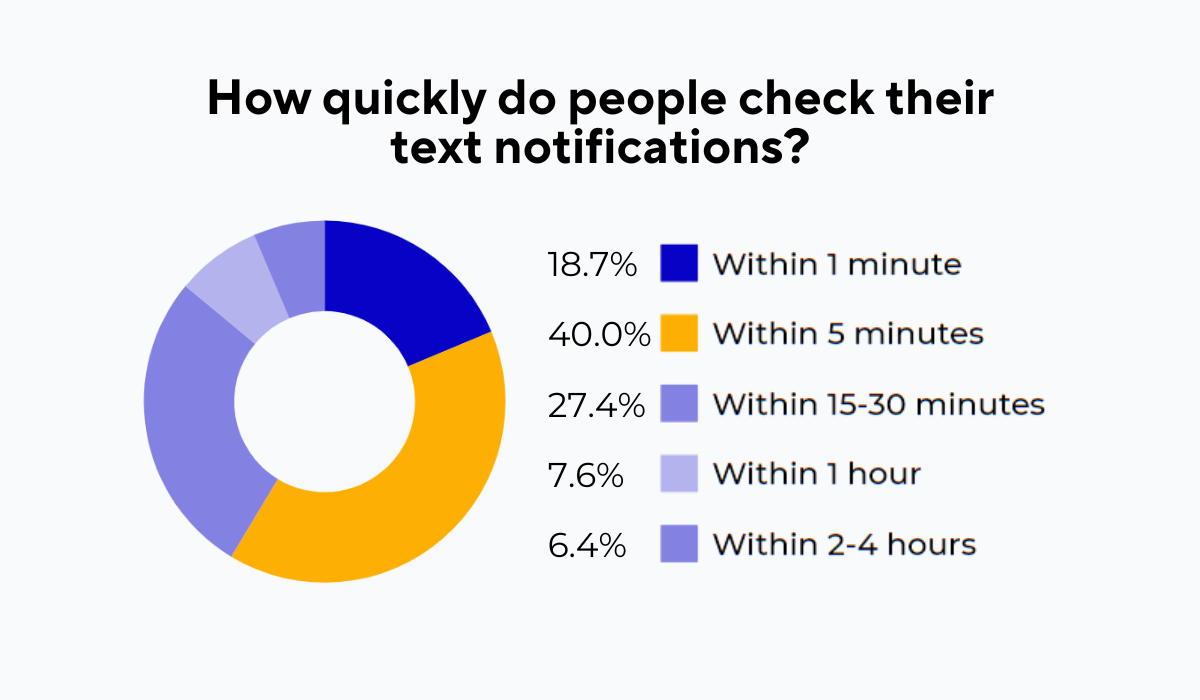
Illustration: Tablein / Data: SimpleTexting
With 68.7% of people reading text messages within 1-5 minutes, it's no wonder smart reservation systems, including Tablein, offer SMS reminders.
In our system, you can set up the following reservation-related text message types:
- Confirmation texts
- Reminders sent a day before a booking
- No-show texts
- Table’s ready messages
Finally, for the most stubborn no-show offenders, we have to mention the ultimate deterrent—a reservation deposit feature.
Imagine a guest trying to book and seeing the popup shown next.
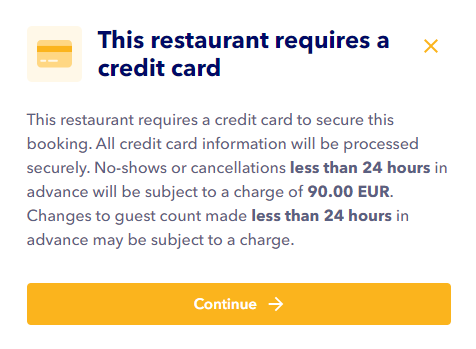
Source: Tablein
Suddenly, becoming a no-show has more severe consequences.
No-show fees can make anyone who doesn't take their reservation seriously think twice, ultimately protecting your bottom line.
Overall, combining confirmations, reminders sent through both email and SMS, and even the option of reservation deposits can give you the tools to significantly reduce those frustrating empty tables.
Captures Valuable Guest Data
For our final benefit, let's explore how reservation systems transform the way you collect and utilize guest data.
Without a centralized system, your knowledge of individual guests is likely limited.
Sure, you will recognize those friendly regulars, but do you know their email address so you can send them a birthday promotion?
Or can you recall how many times they've had to cancel last minute?
A robust online reservation system solves this problem, offering valuable insights that are nearly impossible to gather manually.
Let's go back to Tablein and explore our guest database features.
For starters, you can create editable guest profiles with our guest book feature, and have them include some essential information, as illustrated below.
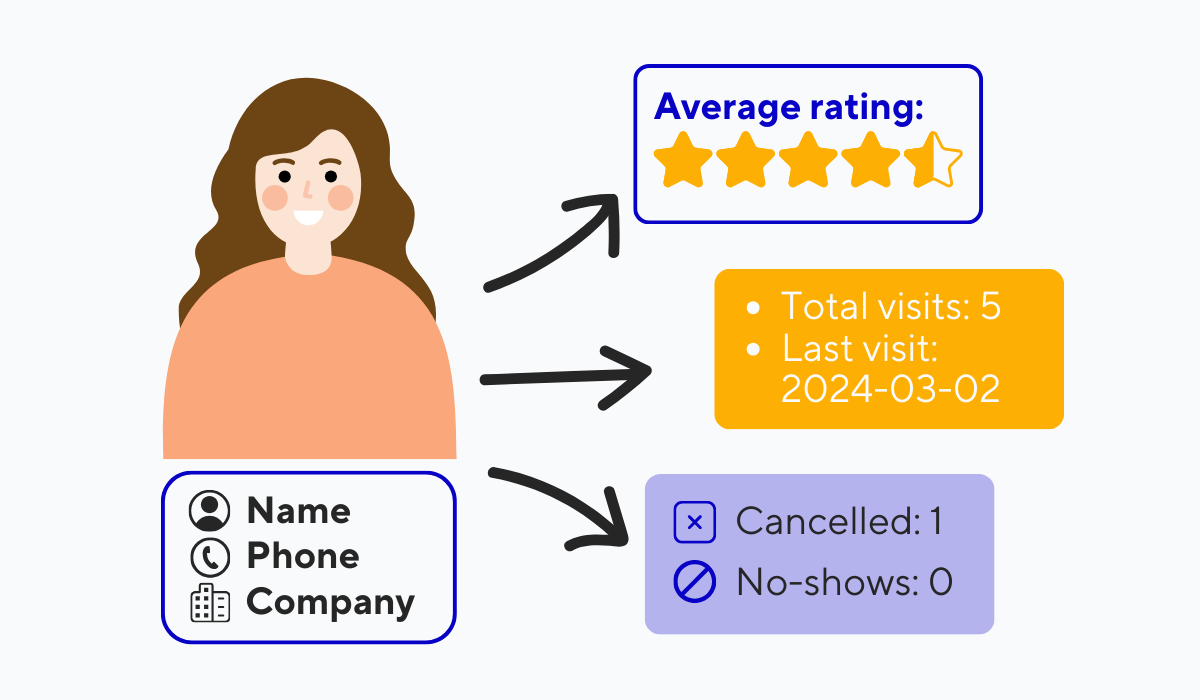
Source: Tablein
Details like contact information, reservation activity, including cancellations and no-shows, and feedback data are all readily accessible.
Having all of this info at your fingertips is incredibly powerful!.
For instance, have you noticed that a lot of guests cancel quite frequently, or that the number of no-shows has increased?
Perhaps it's time to implement a deposit policy.
Or, you may see one of your regular patrons’ ratings have started to decline.
That could be a prompt to investigate any potential service issues.
But you can take it a step further, and personalize these guest profiles by adding notes and tags specific to each guest, highlighting some of the aspects illustrated in the image below.
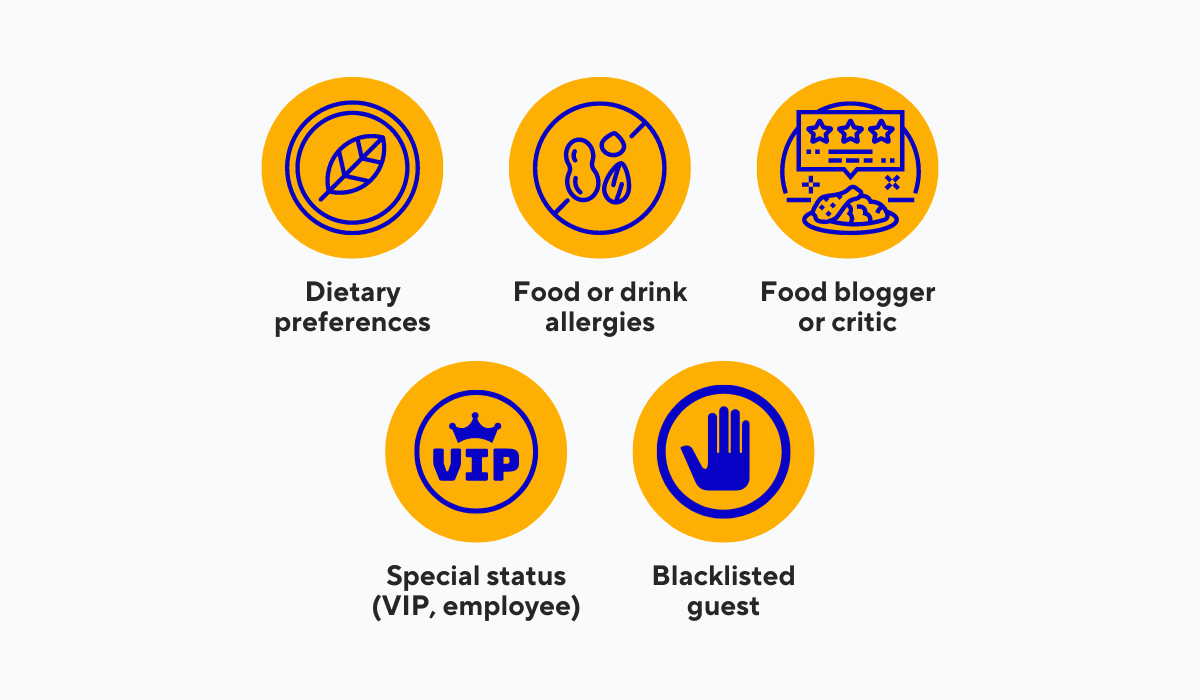
Source: Tablein
Knowing that Mrs. Smith is vegan with a glance at her reservation saves your staff fumbling for info during the dinner rush.
Or what if one of your guests is an influential food blogger? With the right tag, your staff can quickly notice this fact and try their best to impress.
While individual profiles are valuable, Tablein lets you export your entire guest database.
This wealth of data opens the door for targeted marketing campaigns.
Want to target guests with upcoming birthdays?
Just sort all of the data by the guest’s birth dates to figure out who to target.
Or maybe you want to reward a segment of your guests in a similar way, like in the example shown below.
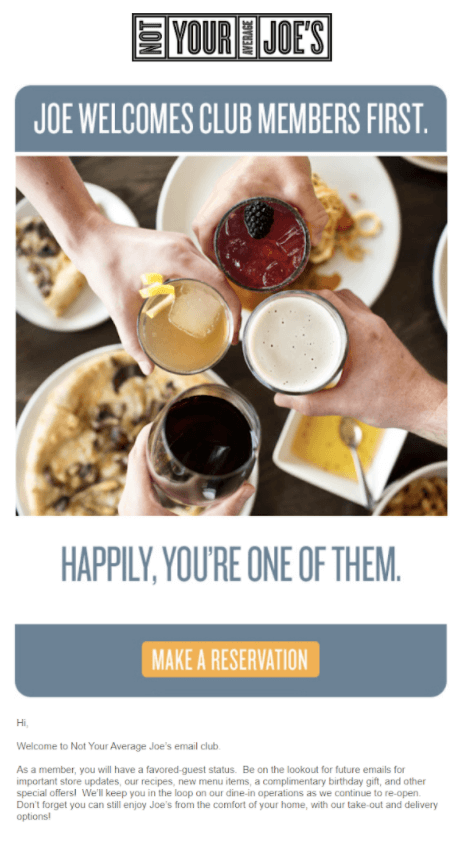
Source: Toast
The team at Not Your Average Joe’s fosters loyalty by creating a sense of exclusivity for their mailing list subscribers.
You could implement a similar strategy for your most frequent diners and VIPs, offering small perks to show your appreciation.
A comprehensive guest database can fundamentally change how you understand and cater to your clientele.
It's the key to personalized experiences and marketing opportunities that build loyalty and keep guests returning time and time again.
Conclusion
With that, we've explored five key ways an online reservation system can elevate your restaurant operations.
From enhancing the guest experience and reducing manual workload to lowering no-show rates and providing you with powerful data insights, the perks are undeniable.
Even a single one of these benefits is compelling, but together, they should be enough to make you at least try out some demos or free trials.
Armed with this knowledge, it's time for the next step—exploring the best systems out there and seeing which one aligns perfectly with your restaurant's needs.
Trust us, the investment is well worth the transformation it can bring.
Get a 30-day Exclusive Trial
As a Tablein blog reader, you’re eligible for an exclusive 30-day free trial to experience our simple reservation solution for your restaurant.
Enter your business email, and we’ll send you all the steps needed to create your account.
Share this
You may also like

8 Best Restaurant Reservation Systems

Pros & Cons of Taking Reservations at Your Restaurant
